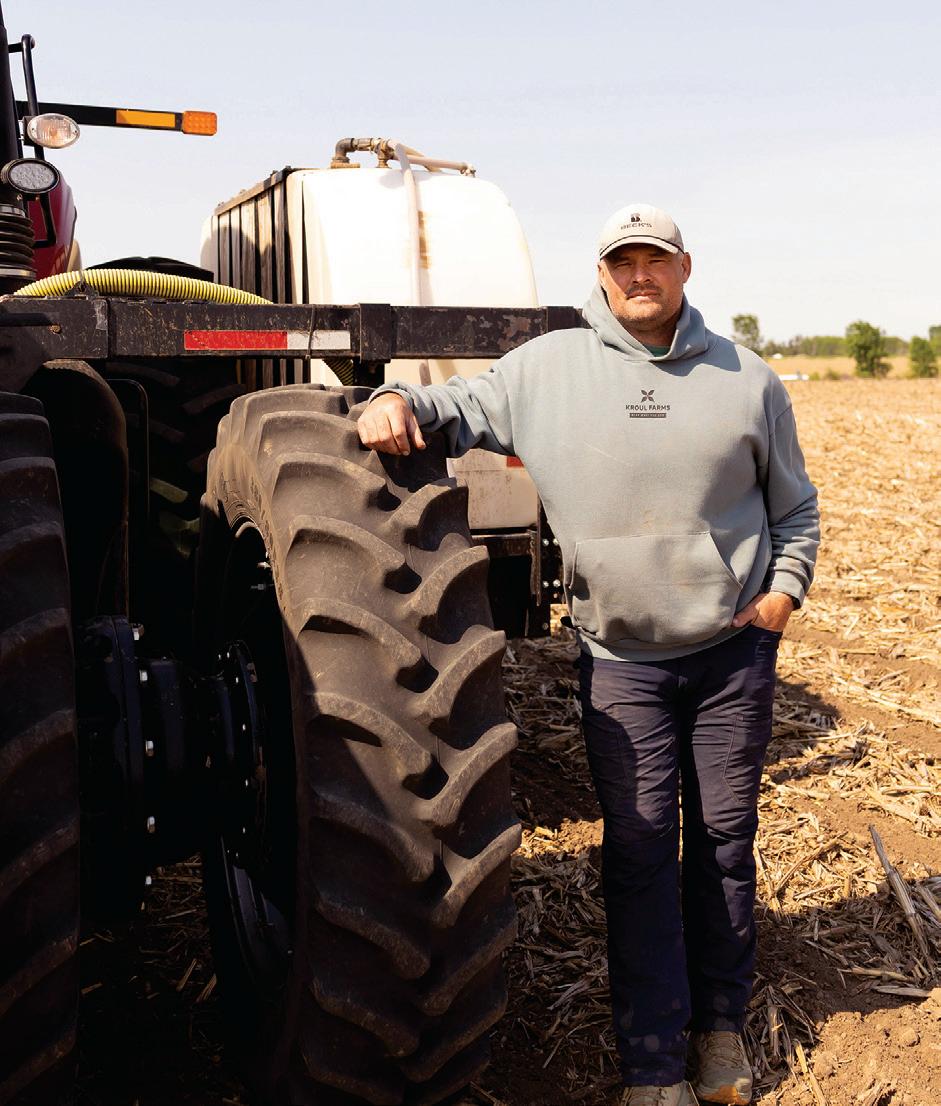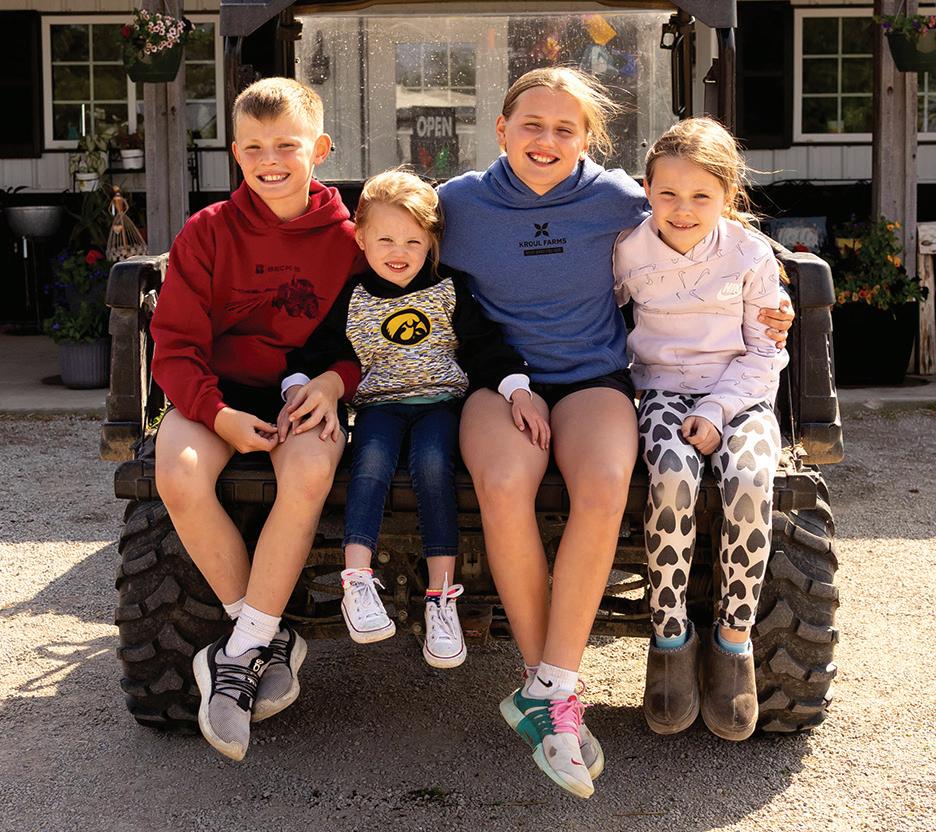
7 minute read
Gridirons and Greenhouses
Gridirons and Greenhouses
By Gretchen Westdal Centers
In an outbuilding on Highway 1 in Mount Vernon, settled between acres of sprouting corn and soybeans, Matt Kroul takes a rare break. He’s on the phone with his business partner and wife, Nicole, navigating the logistics of being interviewed for a story. Juggling marketing plans and business administration tasks for the farm, Nicole directs Matt to where he can find the interview link.
Their conversation is full of fits and starts — neither one needing to finish a sentence, as the other already knows what’s coming. It’s a familiarity born of hours, days, months and years working side by side to build the life that led them to Kroul Farms.
They met in their early days at the University of Iowa: two small-town farm kids who, in between helping on their families’ operations, were deeply involved in high school sports. That early pull between two passions would become a common thread throughout their lives.
Matt was a starting defensive lineman for the Hawkeyes, and Nicole was active in student organizations. Their time at Iowa was devoted to what they were most committed to: school, football and one another. It paid off.
After college, Matt was drafted into the NFL, from the Hawkeyes to the New York Jets. From the comfort of Iowa City to the hustle of New York City, they were in it together. They stayed out east for about a year before returning home, starting a family and getting back to farming.
“You never want your time playing a game to end,” Matt says. “Athletics were always a part of my life; my parents let me focus on that. I was able to take football as far as I could, and I saw the opportunity here, at the farm, to turn this into something bigger.”

“I think once you started down that path of farming fulltime, you were kind of hooked,” Nicole adds with a smile.
Together with Matt’s parents, John and Kaylene, the Krouls own and operate a diversified farm that produces corn, soybeans, pumpkins, a wide variety of seasonal vegetables — including sweet corn — flowers, firewood and raise cattle and chickens for beef and eggs. They also offer a Community Supported Agriculture (CSA) program, allowing customers to receive farm-fresh produce delivered straight to their doors.
In addition to traditional farming operations, the Krouls invite the community to tour their farm, attend seasonal events and pick pumpkins in the fall. It’s a busy and demanding life. But, like many farmers, they don’t shy away from hard work.
“Early March is when things really start to ramp up,” Matt explains. “We’re always doing something, but early spring is go-time. We fire up the greenhouses, getting all the flowers in. We start all our vegetables from seed. We run about 140 head of beef cows and have a cow-calf operation, so we start calving around March 15. Firewood is year-round now — it used to be just in winter — but we have quite a few bundling contracts. And then there are the flowers and opening the farm to the public.”
Kroul Farms opens when the spring weather cooperates each year and runs through October 31. Nearly 30 years ago, Matt’s parents began welcoming visitors to pick pumpkins, and people have been coming ever since. Spring and summer are filled with kids and adults learning about farm life and filling baskets with fresh flowers and produce. Fall features a corn maze, an expansive pumpkin patch, spooky sights and festive fall decorations. Throughout the year, beyond the day-to-day farming, the Krouls host dinners and community groups to share the fruits of their labor and celebrate togetherness.

“We walk a fine line between maintaining a traditional, working farm and offering experiences visitors may enjoy,” Nicole says. “We wrestle a little bit with how much extra to do because it’s so important for people to understand where their food comes from, how we produce it and what farms do. Some places have a farm feel but are purely for entertainment. The more we try to compete with that, the less successful we will be.”
So, they forge their own path — doing what works for their farm and community. That community often connects back to athletics. In July 2024, Kroul Farms hosted the Big Ten Life Experience Series, welcoming student-athletes, coaches and staff to learn about the business and practice of farming. Participants planted produce and flowers and collected eggs.
Nicole explains that they love seeing families, school groups and people of all ages enjoy the farm while learning about and interacting with the work that keeps it running. They’ve never charged admission, honoring their commitment to making farm education accessible to everyone. It’s not always easy — but then again, when is farming ever easy?
Kroul Farms also includes 550 acres of traditional row crops, which Matt, his dad, brother, and their employees manage. Corn and soybeans make up much of the yield. About 235 acres of soybeans are rotated to support soil conservation. After harvest, the Krouls plant a rye-clover cover crop, which not only aids in field restoration but also feeds their cattle. They’re committed to sustainable and responsible farming practices, using no-till methods, repairing buffer zones and participating in conservation reserve programs, ensuring the land remains fertile and healthy for the next generation.

Like many family-run farms across Iowa, the Krouls look to the future with optimism and realism.
“We want to expand on the legacy created by my parents and their parents,” Matt says. “They’ve been farming for 40 years and have their way of doing things. It’s helped spark an entrepreneurial spirit in us to build on what they’ve done. We want to balance the past with the present. Sometimes, we’ve got to remind them of the risks they took. It’s one thing to be a family business. It’s another thing to be a family farming business.”
“It’s not for the faint of heart,” Nicole adds. “We’re all focused on growing the business using our strengths and staying committed to what has worked — and what will work best for our family and the farm.”
Matt and Nicole continue exploring new ways to welcome visitors to the farm while maintaining sustainable practices, hoping one of their four children might one day carry on the legacy.
“We continue to adapt and grow,” Matt says as he heads back to work. “In the next 10 to 15 years, around 60% of farmland will change hands. It’s going to be a major transition — not just for Iowa, but for the entire Midwest. We want to be ready for that. That’s the number one thing. Amid all the chaos, Nicole and I have to celebrate what’s working and stay open to the possibilities of what we can do next with this land that’s ours.”

America Needs Farmers
In 2019, Matt Kroul was inducted as the eighth honoree into the Iowa Farm Bureau’s America Needs Farmers (ANF) Wall of Honor. ANF, created by legendary Iowa Football Coach Hayden Fry, is a commitment to Hawkeye players, fans and Iowans to recognize the necessity and resilience of farmers.
Born out of the 1980s farm crisis that deeply affected Iowa families, ANF became a symbol of support. Fry, who coached at Iowa from 1979 to 1998, witnessed firsthand farmers’ hardships. In 1985, he wanted to help and introduced ANF on his players’ helmets to raise awareness. That symbol helped elevate their struggles.
Today, ANF supports the fewer than three percent of Iowans who farm, lifting their voices and encouraging innovation and efficiency to sustain their livelihoods for future generations.











